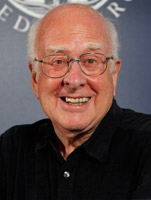
The prize recognises his 1964 theory of how elemental particles achieve mass, and its effect on our understanding of physics.
Professor Higgs’ theory was confirmed through the identification of a particle consistent with the Higgs boson at CERN’s Large Hadron Collider in 2012.
The prize is shared with Professor François Englert, a retired professor at the Free University of Brussels and one of several co-authors of the theory.
Professor Higgs’ association with Edinburgh began in 1954, when he moved to the University for his second year as a Royal Commission for the Exhibition of 1851 Senior Student.
In 1960 he returned to Edinburgh from London to take up a lectureship in Mathematical Physics at the Tait Institute.
His groundbreaking 1964 paper demonstrated how elemental particles achieved mass through the existence of a new sub-atomic particle, which became known as the Higgs boson.
He was promoted to Reader in 1970, became a Fellow of the Royal Society of Edinburgh in 1974 and was promoted to a Personal Chair of Theoretical Physics in 1980.
He was elected Fellow of the Royal Society in 1983 and Fellow of the Institute of Physics in 1991. Professor Higgs retired in 1996.
His contribution to physics has been recognised by numerous academic honours.
He has received honorary degrees from 11 UK universities including Edinburgh (1998), Swansea (2008), Cambridge (2012), St Andrews and Manchester (2013).
His achievements have also been recognised in a major new research centre, the Higgs Centre for Theoretical Physics, based at the University’s King's Buildings campus.
In the 2013 New Year Honours List he was appointed a Companion of Honour.
Photograph © Callum Bennetts/Maverick Photo Agency

